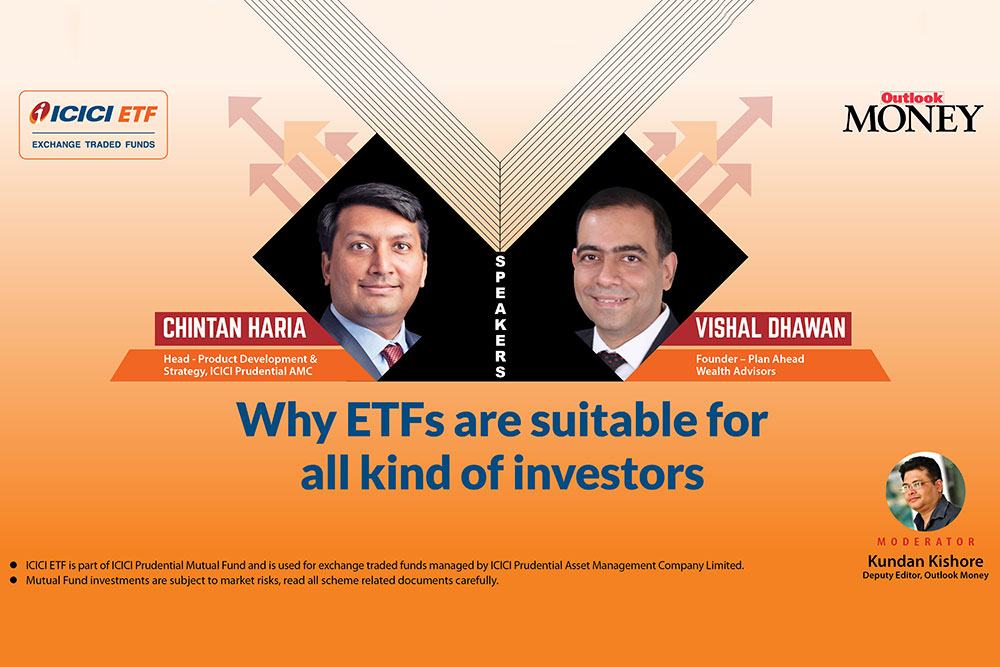Exchange-traded funds (ETFs) are becoming popular among retail investors. These are passive funds that trade on the stock exchanges and can be bought and sold just like stocks. In a recent discussion with Kundan Kishore, deputy editor of Outlook Money, Chintan Haria, head of product development and strategy at ICICI Prudential Mutual Fund, and Vishal Dhawan, founder of Plan Ahead Wealth Advisors to explained how ETFs work and whether they are suitable for all kinds of investors.
How Are ETFs Created?
Haria explained how ETFs are created and how market makers have a role to play. “There is a market-making mechanism in which there is no natural buying or selling if you see multiple people trading on the stock exchanges. But for some ETFs, if there is no natural seller, there are only buyers, then it is the market maker or the authorised participant who will provide the liquidity on the other side with buying or selling,” he said.
The mechanism works like this, suppose the market maker is buying on the exchange parallelly the market maker will sell the units to the AMC and the AMC will extinguish those units by selling the stock, he explained.
Diversification Benefits
You can invest in multiple assets via ETFs. “ETFs started with gold. After that, equity became a more popular asset class for ETFs. So, effectively, you can buy either equity, gold, bonds, debt or commodity ETFs,” said Dhawan, adding that they can also give exposure to the international markets. A robust and diversified portfolio can in fact be entirely built using ETFs.
“For the core allocation, especially on the large-cap side, investors need to seriously think about using ETFs and index funds, because they’re able to get it at a low cost,” said Dhawan.
As part of asset allocation, most investors are looking at passive funds also as a core part of the portfolio, said Haria.
“I think we are increasingly seeing around 75-80 per cent of investors’ portfolios in active schemes, 20-35 per cent of the portfolio being in passive schemes, including index funds and ETFs,” he said.
Also, there are advantages of ETFs being used as margin for derivatives, said Haria. “So you are trading in markets or you’ve invested in markets you want to book profits and you want to park your surplus money and yet have that money available in cash. Want to invest in the markets again, you can simply park in ETFs for liquidity. And then whenever you need, you can invest in the market and sell the liquid ETF,” he added.
Taxation of ETFs
ETFs are taxed as per the underlying asset class in that ETF. For example, if you’re looking at equity-oriented ETFs, they get taxed just like equity, where you get taxed at 15 per cent if you hold for the long term. If you’re looking at international, debt, liquid, gold, and commodities ETFs, they’re all taxed in slightly different manners, and the definition of long-term and short-term is different, explained Dhawan.
SIPs play a very important role, as a mechanism of investing in a mutual fund and are quite popular as far as ETFs are concerned but it is up to the broking platform that you use, said Haria.
Are They Meant For Steady Income?
Dividend distribution is not happening yet in India as ETFs are designed for growth rather than steady income. “The dividends that are given out by stocks, for example, typically, accumulate within the ETF price itself. So, the collection of dividends is happening from the stocks at the ETF level, but the distribution is not taking place yet in India,” said Dhawan.
Internationally, some ETFs pay out a dividend as well instead of reinvesting it. “I suspect India will also probably follow soon, at some point where you know, cash flows will be possible. But today, some of the broking platforms may allow you to set up a withdrawal system to be able to create an income for yourself,” said Dhawan.
He added that SWPs are, normally, more efficient, especially for those who are in higher tax brackets.

